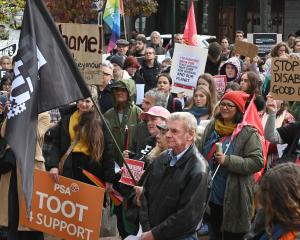Sexual grooming cases are rising in the Southern region and throughout New Zealand, with sexual predators trawling social networking sites for young victims.
Statistics New Zealand figures show sexual-grooming offences in the country more than doubled between 2006 and 2009, from 15 to 36.
Resolved cases totalled 12 and 27 for those years respectively.
The most common offence was meeting a young person following sexual grooming, with 25 such offences recorded last year.
Southern region sexual grooming offences doubled between 2006 and 2009, from two to four.
Both 2006 cases were resolved, as were three from 2009.
Detective Sergeant Malcolm Inglis, of the Southern region child abuse team, described the increase in reported cases as "major".
The internet was a leading form of communication and it opened up the world for offenders.
Rather than thousands of offenders in New Zealand, children were exposed to millions of offenders from overseas.
He said parents should check to see with whom their children were communicating.
"We are very against computers in private areas," he said.
Parents needed to be open about discussing internet safety with their children so they felt comfortable raising concerns with them.
Sexual groomers often preyed on victims who had low self-esteem or who were lonely, with young girls the most common target.
"They are very good at it. They know how to make these young people feel pretty special," Det Sgt Inglis said.
These people, often older males, contacted their victims by creating fake profiles on social networking sites and striking up relationships.
Sites were also used to obtain cellphone numbers to randomly text children.
Once texting began, the messages became sexually explicit and photographs were often exchanged.
"Young girls, and boys, have got to be careful with what they are sending, and to whom, as there is a very high chance it will end up on the internet."
Detective Senior Sergeant John Michael, police national online child-abuse team head, said cases were increasing nationally and internationally.
"Part of the reason is still a real lack of education out in the public with both children, teenagers, and parents," he said.
"It's all to do with how much personal information you place on those social networking sites.
"If you have got a sexual predator there who's keen to find out further information, there are plenty of ways to do it."
A lack of technology knowledge could result in people not restricting who could see personal information on their sites, he said.
In order to keep their children safe on the internet, parents needed to be actively interested in what they were doing.
New Zealand Police, the Department of Internal Affairs and New Zealand Customs, worked together and with overseas agencies to target the "borderless crime".
If parents or caregivers were concerned about the safety of a young person, he advised them to cut off the contact, and involve the police if they suspected a person of being a sexual predator.
NetSafe executive director Martin Cocker said people using social networking sites needed to be aware of their "digital footprint".












